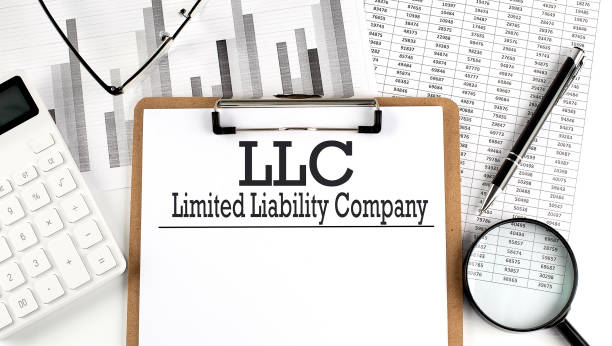This article will cover the basics of LLCs, including how landlords can take advantage of them, the process of forming an LLC for a rental property, and some commonly asked questions about LLCs that landlords may have.
Limited Liability Company(LLC)
LLC stands for Limited Liability Company. It is a legal business structure that combines the limited liability protection of a corporation with the tax benefits of a partnership or sole proprietorship.
In an LLC, the owners, who are known as members, are not personally liable for the debts and liabilities of the company. This means that their personal assets, such as their home or car, are protected in case the company faces legal action or financial troubles.
The specific steps and requirements for creating an LLC may vary by state, so it’s important to research the rules and regulations in your area. You may also want to consult with an attorney or accountant to ensure that you are following all legal and financial requirements.
Benefits of forming an LLC for your rental property
Limited liability protection
Creating an LLC for your rental property can provide a range of benefits for landlords. One of the most significant advantages of forming an LLC is limited liability protection. By creating an LLC, you can separate your personal assets from your rental property, protecting you from any lawsuits or debts related to the property. This can be particularly valuable for landlords, who may face legal challenges from tenants, contractors, or other parties.
Pass-through tax treatment
In addition to limiting your financial risk, forming an LLC can also offer tax benefits. LLCs are pass-through entities, which means that profits and losses are passed through to the individual members’ tax returns. This can help you avoid double taxation and may allow you to take advantage of certain tax deductions and credits.
Professional image as landlord
Beyond the financial advantages, creating an LLC can also enhance your professional image as a landlord. Having an LLC can give your business a more professional and legitimate appearance, which can help you attract and retain high-quality tenants and business partners.
Another advantage of forming an LLC is the flexibility it offers in terms of management structure. An LLC can be managed by its members or by appointed managers, giving you the freedom to choose the best management structure for your needs. This can be particularly valuable for landlords who want to have more control over the day-to-day operations of their rental property.
Secure external funding
Finally, creating an LLC can make it easier to secure funding for your rental property. By having a separate legal entity, you can apply for loans and credit in the name of your LLC, which can make it easier to access funding and manage your finances.
Overall, creating an LLC for your rental property can provide valuable protection, tax benefits, and professional advantages, making it a smart choice for many landlords.
How to create an LLC for a rental property
Creating an LLC for your rental property involves several steps. Here’s a general overview of the process:
- Choose a name for your LLC: The name must comply with your state’s LLC naming rules and must be distinguishable from other businesses in the state.
- File articles of organization: This is a legal document that establishes the existence of your LLC and provides basic information about the business, such as its name, address, and purpose. You’ll need to file this document with your state’s secretary of state office and pay a filing fee.
- Obtain any necessary licenses and permits: Depending on your industry and location, you may need to obtain business licenses or permits before you can start operating your LLC.
- Draft an operating agreement: This is a legal document that outlines how your LLC will be run, including the rights and responsibilities of the members and how profits and losses will be allocated. While this is not a legal requirement in all states, it’s generally recommended to have one in place.
- Obtain an Employer Identification Number (EIN): This is a unique identifier for your LLC that is required for tax purposes. You can apply for an EIN from the IRS.
- Register for state taxes: Depending on your location and business activities, you may need to register for state taxes, such as sales tax or employer withholding tax.
- Transfer ownership of the rental property to the LLC: You’ll need to transfer the ownership of the rental property to your LLC to ensure that it is legally recognized as a separate entity.
Keep in mind that the specific steps and requirements for creating an LLC may vary by state, so it’s important to research the rules and regulations in your area. You may also want to consult with an attorney or accountant to ensure that you are following all legal and financial requirements.
How to transfer the property title to an LLC?
Transferring the title of your rental property to your LLC involves several steps. Here’s a general overview of the process:
- Check with your mortgage lender: If you have a mortgage on your rental property, you’ll need to check with your lender to see if there are any restrictions or requirements for transferring the title to an LLC. Some lenders may require you to obtain their permission before making any changes to the property’s ownership.
- Create the deed: You’ll need to create a new deed that transfers ownership of the property from your name to your LLC. This document should be prepared by an attorney or title company to ensure that it is legally valid.
- File the deed: You’ll need to file the new deed with the county recorder’s office in the county where the property is located. This will make the transfer of ownership official and public record.
- Update your property insurance: Once the property is owned by the LLC, you’ll need to update your property insurance to reflect the new owner. This may require a new insurance policy or endorsement.
- Update your rental agreements: If you have existing rental agreements with tenants, you’ll need to update them to reflect the new owner of the property.
- Update your business records: You’ll need to update your LLC’s records to reflect the new ownership of the property. This may include updating your operating agreement, obtaining any necessary licenses or permits, and registering for state taxes.
Keep in mind that the specific requirements for transferring ownership of a rental property to an LLC may vary by state and local jurisdiction. It’s important to consult with an attorney or title company to ensure that you are following all legal requirements and protecting your personal and business interests.
When NOT to create a LLC for rental property
While there are many benefits to creating an LLC for your rental property, there are also some situations where it may not be necessary or advisable. Here are a few scenarios where you may not need to create an LLC:
- You have a low-risk rental property: If you own a rental property that is low-risk, such as a single-family home in a low-crime area with responsible tenants, you may not need the extra liability protection that an LLC provides. In this case, it may be more cost-effective to rely on standard insurance coverage and proper management practices to minimize risk.
- You’re not concerned about liability protection: If you’re not particularly concerned about liability protection or your personal assets are already protected by other means, such as a trust or other legal entity, then creating an LLC may not be necessary.
- You’re not planning to expand your rental business: If you only own one rental property and don’t plan to acquire any additional properties, then the benefits of an LLC, such as tax advantages and liability protection, may not outweigh the cost and administrative burden of creating and maintaining the entity.
- You’re not comfortable with the administrative requirements: Creating and maintaining an LLC involves certain administrative tasks, such as filing taxes and keeping records. If you’re not comfortable with these tasks or don’t have the time to devote to them, then an LLC may not be the right choice for you.
Ultimately, the decision of whether to create an LLC for your rental property depends on your individual circumstances and goals. It’s important to weigh the potential benefits and costs of creating an LLC, and to consult with legal and financial professionals to determine the best course of action for your specific situation.
The ongoing costs for LLCs
Forming an LLC involves some initial costs, such as filing fees and attorney or accountant fees. However, there are also ongoing costs associated with maintaining an LLC. Here are some of the most common ongoing costs:
- Annual fees: Many states require LLCs to pay an annual fee in order to remain in good standing. The amount of the fee varies by state but is typically a few hundred dollars.
- Taxes: LLCs are pass-through entities, meaning that the profits and losses of the business are reported on the owners’ personal tax returns. However, LLCs may also be subject to state and federal taxes, depending on the type of business and the state where the LLC is registered.
- Registered agent fees: LLCs are required to have a registered agent, which is a person or entity that is designated to receive legal documents and other important communications on behalf of the LLC. Many LLCs choose to hire a professional registered agent, which can cost several hundred dollars per year.
- Accounting and bookkeeping: LLCs are required to keep accurate financial records, and many choose to hire an accountant or bookkeeper to assist with this task. This can be an ongoing expense that varies depending on the complexity of the business and the services required.
- Legal fees: LLCs may require legal assistance from time to time, such as for drafting contracts or resolving disputes. Legal fees can vary widely depending on the nature and complexity of the issue.
It’s important to budget for these ongoing costs when considering whether to form an LLC for your rental property. While the benefits of an LLC can be significant, it’s important to ensure that the costs are manageable and won’t negatively impact your cash flow.
Conclusion
In conclusion, forming an LLC for your rental property can provide significant benefits, including liability protection and tax advantages. However, there are also costs and administrative requirements associated with creating and maintaining an LLC that should be carefully considered before making a decision. Ultimately, the decision to form an LLC for your rental property should be based on your individual circumstances, goals, and risk tolerance. Consulting with legal and financial professionals can help you make an informed decision and ensure that you’re taking the right steps to protect your assets and maximize the benefits of your rental property investment.



